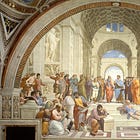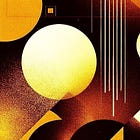3 | METHOD & MADNESS : On Fact & Fiction (in a Non-Moral Sense)
Method & Madness | Book I : Existential Fundamentals
The face of truth is obscured by delusion. Our hands reach out to grasp at a façade, and nature reveals through masked deception.
—F. Nietzsche (ab. M. Hise)
Your world is a story that you tell about what is.
Your world is the way you imagine it to be.
Your world is a fiction; a fantasy fabricated of data gleaned from a reality perceived—never known (at least, a priori). Our experience is fallible—a product of faith: the abject Madness of simple appearance. Absolute knowledge is beyond our reach—thus the world we see can only constitute theory; that is, as opposed to irrefutable reality.1
Reality is to us… only ever as it appears to be.
Take, for example, the colorblind man, who can’t see green. How would you explain to him what “green” might be—
That it’s the color of the grass, and the trees?
Why would he believe you? How should he understand you?
How could he ever know what it is to see “green”?
Imagine that, in reality, there might actually be more colors out there, waiting just beyond your reach. How would you know if they’re real—if they’re there? Could you conceive of a new color… that you’ve never-before seen?
Our perception is focused through the lens of our biology. Our eyes gaze always through this screen, for we cannot see what’s beyond our vision—cannot feel what’s beyond our experience; cannot know beyond our comprehension. To exist is to live by faith and fantasy—to glean data from appearance, constructing for ourselves each our own inner fiction; our own personal delusion—
Our own internal representation: a refraction of what is.2
This is the nature of our existence: that each our worlds are entirely composed of personal abstraction. If we can’t perceive a world composed of Absolute-Objectivity—if, to us, nothing can be truly real—then the imperfect pseudo-reality which remains available to us… must be what constitutes our everything.
Our respective, Subjective realities.
Our Madness is this: sophian scire est in perceptis imperfectis credere.3
Our Madness is this: that our truth is but simple fiction.
Fact and fiction—Method & Madness—are seamlessly woven together. Together, they are your one.
Together, they are your everything.
All Method is born of Madness.
The world we know is a fiction—an abstraction.
The world we observe is theoretically the case.
But if our reality is, in truth, a world which we only assume exists—which we assume that we perceive with fidelity—then…
How can we know what’s true—what’s real?
How can we say, without a shred of doubt, that you and I aren’t actually trapped in a perfect simulation—that we aren’t just a pair of brains floating in a vat4, hooked up to a bunch of wires and cables in the corner of a mad scientist’s laboratory?
If our empirical observations are actually just… empirical assumptions—if everything we think we see is actually imperfect data—then what makes our empirical assumptions any better than dogmatic ones?
What makes our science any better than blind faith?
Imagine this:
You and I are down at the races—the Metafisica Park and Racecourse. The gates open up, and we’re ushered into the venue along with a huge, bustling crowd. I grab us some seats and a couple of beers, then I sit you down between a young couple and this older guy who’s wearing the fanciest suit you’ve ever seen. I hand you your drink and this little silver token, and I tell you this:
Here, at the Metafisica, everyone is given just 1 token to bet with. Your goal is to win, and the prize is what we call “true freedom”—1 billion dollars.You look out at the racecourse—you see only two lanes. Up on the scoreboard, there’s only two names. You squint a little, and you can just about make them out.
The name of the first horse is Verus—
The second horse, Phantasmus.
You ask me about the horses—about how you should decide. I point down at the track, where you can see one brawny, majestic racing stallion lined up against the starting gate. I say this:
Well, they’re over there. That’s Verus, standing in the stall.That’s one horse, you say—what about the other? I say:
Oh—Phantasmus is the favorite. Everybody thinks he’s gonna win.You ask where this horse is—if he’s coming up to the gate soon. I say:
Well, Phantasmus is invisible, you see. Nobody’s ever seen him before. That’s part of what makes him so great—you just never quite know exactly where he is. How could you beat that in a race?You’re quiet for moment… then you ask if I’m crazy—if I’m sure this second horse even exists. I point down at the track again, and I say:
Look—there’s two gates and two lanes out there on the track. Why else would it be set up like that… unless there’s two horses to race?You look around and quickly realize that the young couple sitting next to you are clad head-to-toe in Phantasmus merch—hats and shirts and sneakers, all. The man in the suit twirls his moustache—then, casts his lot for Phantasmus.
You look up at the scoreboard—
The clock is ticking down.
You have 10 seconds left to decide.
You look down at the track, and you see that one stall stands completely empty, still—
Or at least… so you think.
“True freedom”—1 billion dollars—is what’s on the line.
Which horse do you choose… and why?
In simple, logical terms… we can’t bet on Phantasmus.
What, after all, do we actually know about him other than the fact that we’ve been told that he:
Exists, and
Will win?
What if everyone else is wrong? Is that really so unlikely?
What if this is simple fraud, and the entire stadium has fallen for some kind of elaborate scam or scheme? What if they’re just being swept along by the rumor and hype of the Phantasmus fandom? What if it’s selection bias—that I actually sat you down in a section of the crowd filled with Phantasmus fans? For all you know, the entire rest of the stadium could be casting lots for Verus… and this whole time, you’ve been sitting here taking advice from an imbecile—a hardcore Phantasmus man.
It only ever makes sense—it’s only ever really rational—for us to bet on Verus.
While it’s true that there’s a sense in which no horses are ever real,6 it’s still the case that Phantasmus remains purely theoretical, and thus offers us no substantive evidence to support the probability of his existence. The problem with placing our bets with Phantasmus isn’t that we shouldn’t be open-minded about new data… but instead, that it’s impossible to be open-minded about no data.7 Phantasmus, after all, isn’t a new experience—he simply isn’t an experience at all… because no one can perceive him.
What if we were wrong, though? What if Phantasmus is actually real—the magical, invisible, intangible horse that makes his jockey vanish too?
The answer is that it can’t possibly matter, because none of that information can be known—can’t be substantively investigated because it can’t be perceived. We can take no data, can form no premises, and therefore can develop no substantive theory.8 We can’t rationally trust an assertion which can be neither confirmed nor denied…9 and, therefore, we can’t trust the judgement of anyone who tries to tell us that we can.
We can perceive nothing—we can infer nothing10—therefore, we must trust Verus.
Nobody can know for certain—therefore, we must trust Verus. We could never guarantee (even if he were real) that Phantasmus was actually anywhere at all. We could never say for certain that, at the start of the race… he would even be standing in his stall.
We can never speak in terms of Absolutes11—in terms of definitive truth. Instead, we can speak only in terms of probabilities—what we think is likely to be true.
Thus, what’s useful for us—what would be productive—isn’t to sit around wishing we could access an Absolutely-Objective reality… or to delude ourselves into believing that we can possess perfect truths. What’s useful is to cultivate a confidence—a faith—instead in our experience and Individual-Subjectivity. When it comes time to bet, after all, we can never be certain—we can never know that we know what’s real. The best we can do is make an educated guess; to form a theory from the data we believe we perceive—the information we assume to be true and real.
The goal of science has never been absolute certainty. Instead:
It’s only ever been to be certain to the best of our ability.
Truth can’t be an inherent property—neither to knowledge, nor to reality. The inherence of a truth, after all, would be impossible to claim or prove, because any world of Absolute-Objectivity would necessarily exist beyond our abstraction; never observed, only inferred—known only in theory, but never in reality. We can’t know anything to be absolute truth, because:
Truth is knowledge that we create… through the stories that we tell about our world.12
Now, to Putnam13:
Could we be just brains in vats?
Could we be trapped in a perfect simulation?
There’s a theoretical sense in which this is literally possible… and a pragmatic sense in which we quite obviously are.
We are trapped in a perfect simulation; an imagined abstraction—a refraction of a reality which we can only infer exists beyond it. But this is nothing fantastical—not some kind of reality-bending, world-altering psychedelic revelation. This is, instead, quite literally just the way it’s always been—the way which we, as human beings, have always experienced the world.14
Your brain is trapped, floating in a vat…
And that vat is called your skull.
Truth is theory—an abstraction born of science. Our simulation is just the way we perceive.
Our Method is this: verus noster ex solo somnio nascitur.15
Our Method is this: that we cleave from fiction a semblance of truth—
And all Method is born of Madness.
As in Popper, where it’s logically impossible for a theory to pass a threshold of validity (i.e. to be supported by sufficient evidence) which should cause us to consider it to be Absolutely-Objective knowledge: that is, a statement which represents literally irrefutable or unquestionable truth… unless, of course, you are either deluded or insane.
As in Plato, wherein the allegory of the cave is a thought experiment which features a number of prisoners chained to a wall inside a dark cave, where they’ve spent the entirety of their lives. Behind them there’s a light, and between them and the light objects are moved back and forth, causing shadows to be cast onto the wall before them. Because this is all that the prisoners have ever experienced or perceived, these shadows are—for all intents and purposes—what constitutes their reality.
Our science is but faith in our fallible senses.
As in Putnam.
This a common logical fallacy. Correlation does not equal causation—and, in this case, the fact that there are two gates and two lanes obviously does not guarantee that any two given horses actually exist, let alone that they’re standing in any two given stalls; that is, not any-more-so than the fact that there are two stalls in a given restroom should indicate that both stalls are currently occupied.
i.e. because our perceptions are subjective and imperfect, it could be argued that the concept of a horse itself is, in actuality, (as in Hume’s bundle theory) just an internal representation of perceived sense-data, and therefore a personal abstraction.
This is, of course, unless you’re either deluded or insane.
This would obviously change if we were, for example, somehow able to obtain new evidence and observe that Phantasmus leaves credibly-perceptible traces of his existence—visible tracks in the dirt, audible whinnies or neighs when nearby, a plume of dust behind him when running, piles of inexplicably-appearing dung, or a jockey who seems to immediately vanish from existence when he mounts the horse. All of these things would constitute substantive evidence that Phantasmus is real…. and all of these things would also represent empirical data.
As in Popper, wherein if a statement cannot be theoretically falsified, then it cannot logically be considered substantive.
That is, aside from the fact that nobody else can perceive Phantasmus either.
Unless, of course—once again—you are either deluded or insane.
There is, in effect, no True-physical reality. There is the Metaphysical, which is the theoretical-physical—then, there is the empirical, which is the perceived-physical. The world does not (to the best of our knowledge) act upon us with Agency; it does, however, affect us by means of natural entropy. We know logically, however, that these affectations must be either perceived or theorized—never known directly (i.e. inherently) in any other way.
Hilary Putnam (1926-2016), 2nd-generation analytic. Prominent professor of philosophy at NWU, MIT, Princeton, & Harvard.
Biology is hardware which stores experience. The self is software; an emergent phenomenon. The self is not atomic (in the old Greek sense, i.e. an entity which can’t be broken down into constituent parts, like some kind of immutable spirit or soul), but is instead dynamic—ever-evolving to adapt to new circumstance. The self—the mind—is what emerges from the aggregate of experience. The self is the stories which you compose and collect—the truths which you invest and believe in. Thus, you are a being of composed of sheer experience—of the history etched into your biology.
Existence is wrought from but a simple dream.













